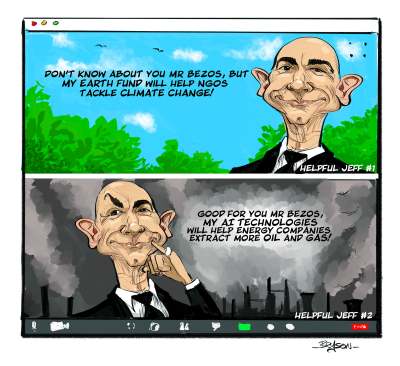Google, Apple, Microsoft, Facebook and Amazon all signed up to the “we’re still in” campaign whose signatories promise to “pursue ambitious climate goals ... as part of the global effort to hold warming to well below 2°C.”
In terms of brute financial self-interest, you’d expect the IT sector to be somewhat less negatively inclined towards climate action than some other industries. While IT obviously does have a climate impact (particularly making the actual devices), it is a big part of most low-carbon future scenarios – ‘dematerialisation’ into the weightless digital world is often discussed as a way to cut emissions.
The IT companies are certainly trying to position themselves as climate leaders. In January, Microsoft published a detailed ‘carbon negative by 2030’ plan, and Amazon has pledged to get to neutral by 2040 (‘neutral’ or ‘negative’ here do not just mean offsetting).
They are also throwing some money around: Microsoft’s plan includes a $1 billion fund to “accelerate the global development of carbon reduction, capture and removal technologies”.
And, in February, Amazon Chief Executive Jeff Bezos announced his not-so-humbly named “Bezos Earth Fund”, a $10 billion fund to help tackle climate change. That’s more than double the tax that Amazon has deigned to pay globally since 2010.
Oil in the cloud: Creating AI for oil and gas extraction
However, how deep the tech giants’ climate commitments run looks rather questionable – as one hand is writing them, their other hand doesn’t seem to have quite got the message.
In May 2020, Greenpeace produced a report called ‘Oil in the Cloud’ detailing the partnerships that Amazon, Microsoft, and Google have with oil companies to create bespoke artificial intelligence (AI) software for oil and gas extraction. The fossil fuel industries are increasing their use of AI at an astronomical rate – in 2018, they spent around $1.75 billion on it.
Microsoft is the most involved and has explicitly said that its ‘carbon negative’ plan will not include cancelling these contracts.
After Greenpeace’s report came out, Google, which was already winding its oil and gas contracts down, pledged to stop them altogether. Greenpeace is encouraging people to contact the other two and ask them to follow suit. You can do so here.



